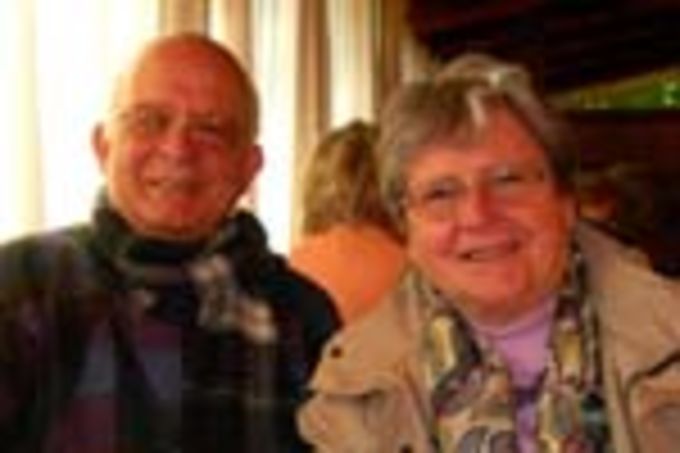Get moving and not wait too long on church headquarters. That’s the strategy the Germans Klaus and Inge Schilbach used to launch what is apparently the sole partnership between a congregation belonging to the heavily-Baptist, German “Federation of Evangelical-Free Churches” and one belonging to the “Russian Union of Evangelical Christians-Baptists”.
15-year Partnership between Ulyanovsk and Krefeld M o s c o w / K r e f e l d – Get moving and not wait too long on church headquarters. That’s the strategy the Germans Klaus and Inge Schilbach used to launch what is apparently the sole partnership between a congregation belonging to the heavily-Baptist, German “Federation of Evangelical-Free Churches” and one belonging to the “Russian Union of Evangelical Christians-Baptists”. Following crossed signals in Moscow, it was a representative of the Russian “Intourist” travel service who, after visiting Krefeld in 1991 under the auspices of a city partnership, obtained the address of the Baptist congrega¬tion on the Volga River in Ulyanovsk. But only two years later was Schilbach, a high-school teacher, totally ready for action: He retired early at age 56 for reasons of health. Since 1993, he and friends have made the long journey from Krefeld on the Dutch border to Ulyanovsk 10 times. Visits in the opposite direction to Krefeld are now occurring every second year.
During this period, Krefeld Baptists have been able to supply the spiritual encourage¬ment and financial injections necessary to get a number of projects rolling in the 300-member congregation pastored by Alexander Levkovsky. First order of the day were humanitarian shipments and completion of the new Ulyanovsk church building. The opening of a soup kitchen and work among drug addicts and in prisons followed. The prisons being visited now include a prison for women.
Those who learned to survive amidst serious repression are not automatically equipped for the offensive style demanded by a pluralistic society. Klaus Schilbach, who spent his career dealing on a daily basis with government officials, therefore attempted to form relationships between the Ulyanovsk congregation and city authorities as well as the Orthodox church. When a visit from Krefeld Baptists is in the offing – the city partnership still exists - visits with communal representatives and Orthodox offices are put on the agenda. “The congregation could cultivate these contacts more intensively,” Schilbach adds. “Why don’t they plan to meet four times annually?” But now it does occur that the congregation will seek out city authorities without a German presence.
The diligent guest from Germany also hopes for closer ties between the congregation and the local university. “That can only be developed by taking small steps,” he states. “We need to get into dialogue with the people there. Crude evangelistic methods will not do.” He regards the local believers in any case to be „amazingly willing to learn“. The long decades sealed-off from the outside had taken their toll. In 1993, some church members still regarded fossils found on the riverbank as the handiwork of satanic powers.
Klaus Schilbach reports that all funds directed towards the Russian project pass across his congregation’s financial desk. “They check every cent – the city of Krefeld contributes nothing.” The initiative on Russia has neither name nor meetings; pressing questions are taken care of in passing. The group has roughly 12 “hard-core” members, including a retired, Catholic policeman who has gone along to Ulyanovsk three times. Some reports on Ulyanovsk appear on pin-up boards and in the church bulletin; local media are also involved on occasion. Ulyanovsk is known as the birthplace of Lenin; Krefeld, for its Mennonites, who have lived there for 400 years. Yet Mennonites are not participating in the Ulyanovsk project.
Klaus Schilbach expects little assistance from Baptist headquar¬ters in general. He reports that his own German federation prefers to negotiate with official organizations, and he alone was only an individual – and a layperson at that. Yet what God had dropped off at his doorstep he did not have the freedom to ignore. That did not always converge with the concerns of German churches or mission organisations, who had already developed a missions programme heavily dependent upon the support of local congregations. Yet sitting between chairs can be an honourable endeavour, he claims: “Then we are open to work in any direction we like.”
Why are Inge and Klaus Schilbach going to so much trouble during the last major chapter of their lives? In certainly isn’t because of the national German state medal awarded to the husband in 2005 for his volunteer efforts. “It’s the love and cordiality there, the resilient faith in the face of extreme odds. It’s the fantasy people put into their efforts to reach others for Christ. No one returns back here without having been spiritually blessed. Those who have been there once are bound to return.” Klaus Schilbach adds a few examples: “One cannot find that kind of openness for the Gospel in German society and in prisons. But someone who visits a prison there gets besieged with questions. People still react there. That encourages us and makes us feel like pushing on. We still have an open door to the prisons of Ulyanovsk. The director of one prison is deeply grateful for our work with prisoners and with drug addicts. We still have vast opportunities. You can make things happen which are now unthinkable in Germany.”
The Krefeld effort is still on the upswing: This summer, two groups totalling 16 persons will travel to Ulyanovsk to help celebrate the congregation’s 90th anniversary on 29 June. That’s when the partnership will also be having its 15th birthday. On the way home, RUECB-offices in Moscow will be delighted to host the group for the first time.
Department for External Church Relations, RUECB
